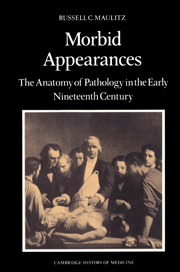Introduction: Ouverture: Bichat's head
Published online by Cambridge University Press: 22 September 2009
Summary
The Père Lachaise cemetery in Paris is known to much of the world as one of the most remarkable monumental legacies of Napoleonic France. Opened in 1804, it is a grand baroque gesture made solid in granite and marble. Its monuments, massed and massive, embody the homage of an entire society to its famous and notorious. Nearly overgrown in a corner of the cemetery rests an unprepossessing stub of a monolith bearing the name “Bichat.” Only the most deliberate of wanderers in Père Lachaise would remark it.
Today medical historians revere the name of Marie-François-Xavier Bichat (1771–1802) as a founder of French scientific medicine. He is seen as a pioneer in the study of tissues and the father of dual medical traditions that came to include such luminaries as François Magendie and Claude Bernard in physiology and Théophile Laennec and Thomas Hodgkin in pathology. Thus it seems only natural that Bichat should be immortalized in the stone of Père Lachaise. But it was not always so. An odd tale looms behind the arrival of Bichat's remains, some forty years after his death, in this final place of rest.
By 1802, at the age of thirty, when today's physicians are often still in training, Bichat was already a respected, if not very elevated, member of the Parisian medical community.
- Type
- Chapter
- Information
- Morbid AppearancesThe Anatomy of Pathology in the Early Nineteenth Century, pp. 1 - 6Publisher: Cambridge University PressPrint publication year: 1987

